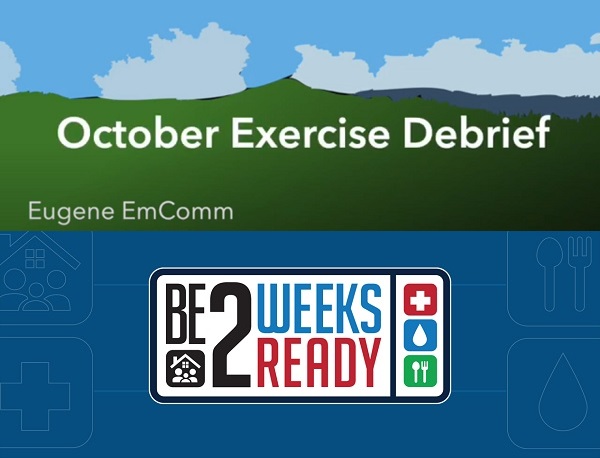Bethel launches ‘Be 2 Weeks Ready’ preparedness program
4 min read
The state has a new emergency preparedness program called ‘Be 2 Weeks Ready.’ It’s very flexible, to let your community discuss preparedness in a way that works for you. One volunteer from Bethel spoke about organizing her first meeting for ‘Be 2 Weeks Ready,’ and discussing the Cascadia earthquake.
[00:00:21] Dawn Scott (Ready NW Eugene): I have a quick update. This is Dawn Scott. I’m in a 113-household 55+ community here in West Eugene, and we talked a lot about our community, what’s going to happen in our community. We have a water facility available, emergency water facility, how would we use that, etc.
[00:00:40] So I did a lot on PowerPoint, talking about the hazards in our community and so on. I didn’t have a dais, but I realized I did have a bucket with a toilet seat lid, so that became my dais.
[00:00:53] So they were looking at me with my toilet, holding up my laptop, and of course it engendered conversation about what you would do with that toilet and it was pretty lively. They wanted to know where I bought the lid. So I brought that up and I showed them where you can buy the toilet seat to fit on the bucket.
[00:01:12] And so it just kind of brought some initial conversation and also we did a little tabletop quiz before the meeting started. I put out a seven-, eight-question quiz about emergency preparedness. How long, for instance, does food last in a refrigerator without power? And they worked on that together and then we reviewed that quiz when we first started.
[00:01:35] So it engendered some interest from the individuals. I had about 17 people from my community of 113 households. They were enthusiastic. They had a lot of questions and I did Chapter 2 of our unit towards the end, after I kind of debriefed with them our hazards and our concerns.
[00:01:55] John Q: The top concern is a subduction zone earthquake.
[00:01:59] Dawn Scott (Ready NW Eugene): One of the things that our group is looking at is, we are right on the edge of folks coming in from the Oregon coast on (Highway) 126. So we will probably be the landing place for people coming in off of the Oregon coast—from that part of the Oregon coast—when they do their evacuation.
[00:02:19] And we will be in a position to help them. They’re putting resiliency centers on our side of town. So we have an additional interest in that possibility, that the Oregon coast folks will be coming into our West Eugene area.
[00:02:35] John Q: The Bethel volunteers also participated in the citywide emergency communications exercise, held annually in October.
[00:02:44] Robert Sprowl (Ready NW Eugene): They use ICS forms, and they track all the incidents and messages via incident numbers, and all that gets forwarded up to the top level. They had pre-scripted scenarios simulating reports from field teams to what they call RTLs, or radio team leads, and then that was forwarded up the chain through the neighborhood ham operators, and then to an EOC.
[00:03:11] John Q: That’s the Emergency Operations Center.
[00:03:14] Dawn Scott: The premise of this exercise was, there was no EOC. The EOC was down. That was what Andy Davis’s wrinkle was this year. What Andy emphasizes—Andy Davis is kind of the lead guy—is ‘Practice, practice, practice.’ And you’ll hear him say that a lot. And it is, you know, getting those radios, turning them on, making sure your batteries are charged, making sure you remember your protocols.
[00:03:43] There are some basic forms, a couple of them that are filled out, the (ICS)-213 that describes the incident in very short and precise terms. And there were some pre-scripted events. One that came in rather late was an alien invasion. Wouldn’t you know that it happened right during an earthquake that the radio teams were broadcasting up.
[00:04:07] So anyhow, I think if we’re going to roll into neighborhoods with Be 2 Weeks Ready, we roll with the radios at the same time, checking in periodically. Friendly does it, I think, once a month. Other neighborhoods do it periodically. Don’t forget, you are the help until help arrives. And that is a big piece of it in the neighborhood, is being able to communicate that need for help upwards, and so, from my perception, is a real important part of our neighborhood’s responsibilities in collaboration with also getting the Be 2 Weeks training out there.
[00:04:42] We’re going to try to roll that at the same time, talking to people about Be 2 Weeks Ready and about emergency radio communications. When you’re talking to them about one thing, you can talk to them about the other thing.
[00:04:54] John Q: Volunteers support their communities with the new state preparedness program, Be 2 Weeks Ready. Dawn Scott and Robert Sprowl can help you connect with training from Eugene EmComm, the volunteer-based emergency communications network.
For more, contact Lane County emergency manager Tiffany Brown, your neighborhood organization, or the citywide preparedness committee of the Neighborhood Leaders Council.






